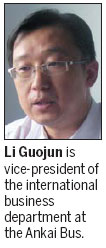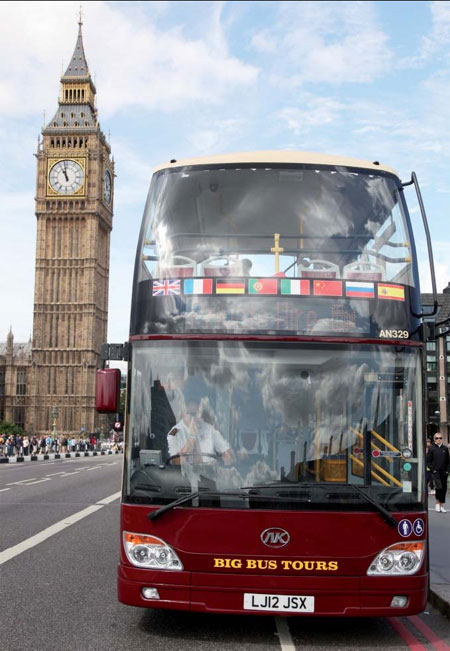Deal puts company at top of the deck
Updated: 2012-08-10 10:44
By Wang Chao (China Daily)
|
|||||||||||
|
The red double-decker bus, made by Chinese company Ankai, takes tourists around London. Provided to China Daily |
Sparkling Chinese additions to a bus fleet chauffeur Olympic Games tourists around London
The roofless red double-decker buses that ply the tourist route taking in Big Ben, Buckingham Palace and Westminister Abbey may seem as dyed-in-the-wool British as London's black cabs, but looks can be deceiving.
Months before the first gold medal of the London Olympics was hung around the neck of the Chinese shooter Yi Siling a fortnight ago, a firm from her country had already bagged a gold medal of its own, winning the contract to supply 20 tourist buses for the capital.
 |
Over the past two weeks thousands of tourists in London for the Games will have clambered onto the buses, made by Ankai Bus Co in Anhui province, East China, where the automaker Chery is also located.
Ankai provided the buses to The Big Bus Company, a tour operator in London whose headquarters are 500 meters down the road from Buckingham Palace.
Ankai started delivering the buses to Big Bus at the beginning of the year, and all passed safety and emissions checks at the beginning of June.
After the Olympics, more buses will arrive in London to replace ones that have had their day.
"The feedback from tourists has been good," says Li Guojun, vice-president of Ankai's international business department.
"The upper deck offers a panoramic view, and the bus is equipped with (an audio) system that can simultaneously translate the travelogue into many languages."
The London tour buses are just part of the joint work between Ankai and The Big Bus Company, Li says.
The partnership started in 2008 when Ankai delivered 30 tour buses to The Big Bus Company in Dubai, to replace second-hand buses bought from European companies.
Since then, Ankai has supplied buses to The Big Bus Co in Hong Kong in 2009 and in Las Vegas last year. Its buses are also in service in Los Angeles, San Francisco, and New York.
"Our goal is to be in every major tour destination in the world," Li says.
Ankai's preparations for taking the buses to London were as onerous as those of an Olympic athlete, with research and testing carried out two to three years before the Games began.
"As we went into the Hong Kong market we were aware it was a good opportunity to test our new buses with the driver on the right," Li says. "Previously, all of our buses were based on Chinese standards."
The roofless sightseeing buses were exported to the United States last year, when they were also given the green light to be sold in the European Union.
The Big Bus Company also buys vehicles from the Swedish companies Volvo Group and Scania Group, and with such reputable competitors, winning the London contract was far from easy, Li says, but the company won on price and value for money.
While the asking price for a bus carrying one of the marquee names can cost more than 300,000 euros, a bus made by Ankai with the optimum configuration costs about 2 million yuan ($314,000, 254,200 euros). But something a little more rudimentary can cost as little as 300,000 yuan.
But price was not Ankai's only selling point.
"Our London partner did research on our products and found they qualified on emission standards, fuel efficiency and safety," Li says.
In addition, Ankai was able to offer "nanny care" to clients, with a service team of 10 or so on standby in London in the event of problems.
Ankai has three major product lines: Setra, Ankai, and JAC. Setra is a high-end bus model licensed by Setra bus, a subsidiary of Daimler.
That line-up combined with attractive pricing and guarantees on efficiency and service seems to have given Ankai a winning formula, because it has obtained large export orders since early last year, including one for 3,000 school buses from Saudi Arabia, one for 350 buses from Russia, and another for 575 gas-powered buses from Pakistan.
Not content to stand still, the company is gradually migrating from traditional markets such as the Middle East to Europe and North America, and is looking at other ways of gaining global competitiveness.
"We are thinking about building factories overseas, since exporting makes the company vulnerable to expensive transport costs, tariffs, and even anti-dumping investigations," Li says.
Shen Jinjun, secretary-general of the China Automobile Dealers Association, says it would be hard for a Chinese brand to get onto the list of the world's top automakers any time soon, so in most people's minds Chinese auto companies will inevitably be stuck with the label "Made in China".
"Because no one has a strong brand that can dispel this image, Chinese automakers are forced to compete on lower prices."
Building factories overseas could alleviate this price pressure because it would greatly reduce costs, Li says. Setting up overseas is not a new idea, having been on the drawing board since 2007, he adds.
Li has just been to South America, well aware that the soccer World Cup will be held in Brazil in 2014 and the Olympics in the same country two years later.
"We are studying local laws, financial regulations and other policies so we can act when the opportunity is ripe," he says.
But any decision should not be rushed, Li says, because overseas competition is becoming more fierce.
"For some reason we cannot catch up with marquee names such as Daimler and Volvo in a short time; and in the medium- to low-end product area, most competitors come from China. The global competition simply reflects what is happening at home."
But heading overseas to compete worldwide is hampered by the lack of an adequate policy framework, he says.
Even though the government encourages companies to go abroad, the financial and regulatory support is lacking, so it is hard and risky for a company to try, he says.
Tao Jingzhou, partner of Dechert LLP, Beijing Representative Office, sympathizes with those companies at the preliminary level of going global but says "being overseas is not the ultimate success".
"The government should encourage innovation so companies can upgrade their product lines, rather than encouraging them to sell products cheaply in developing countries and to make profits by dint of huge volumes."
Despite the constraints Ankai feels, it clearly knows how to cash in on a big occasion. A month after the Olympic flame is doused in London on August 12, the World Economic Forum Summer Davos will be held in the Chinese city of Tianjin. Helping the world's top movers and shakers to get around will be 20 buses supplied by Ankai.
wangchao@chinadaily.com.cn
(China Daily 08/10/2012 page20)
Today's Top News
Rescuers race against time for quake victims
Telecom workers restore links
Coal mine blast kills 18 in Jilin
Intl scholarship puts China on the map
More bird flu patients discharged
Gold loses sheen, but still a safe bet
US 'turns blind eye to human rights'
Telecom workers restore links
Hot Topics
Lunar probe , China growth forecasts, Emission rules get tougher, China seen through 'colored lens', International board,
Editor's Picks

|

|

|

|

|

|






